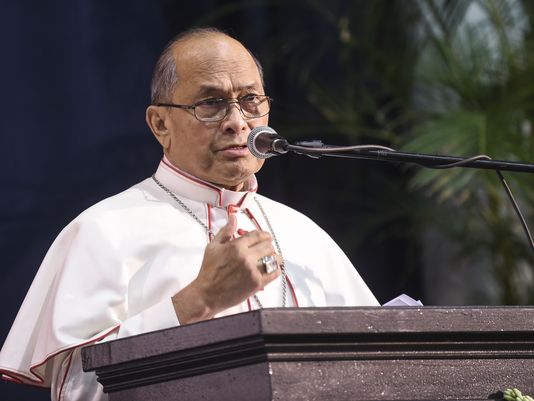Member of Church's Sexual Misconduct Board Resigns
By Jasmine Stole
A member of a board within Guam’s Catholic Church that reviews sexual misconduct complaints wrote an email to the church’s sexual abuse response coordinator Wednesday stating he believes accusations that the archbishop sexually assaulted a minor. Vincent Pereda, the board member who wrote the email, also stated he would resign from the board immediately. Pereda’s email addressed an accusation against Archbishop Anthony Apuron, who oversees the island’s Catholic Church. Roy Taitague Quintanilla, 52, on Tuesday came forward publicly accusing Apuron of molesting him as a 12-year-old altar boy about 40 years ago. Quintanilla delivered a letter for Apuron to the Chancery Office on Tuesday, detailing the abuse. Hours after the letter was delivered, the Archdiocese of Agana issued a three-sentence statement that said it affirms its commitment to its sexual misconduct and harassment policy. In light of Quintanilla’s allegations, the archdiocese statement said the Sexual Abuse Response coordinator Deacon Larry Claros had been informed and was coordinating a response. Part of that response includes convening the Archdiocese Review Board. Now a former board member, Pereda wrote an email to Claros on Wednesday that stated, based on Quintanilla’s disclosure, he believes “credible, reasonable cause does exists … that the archbishop had engaged in sexual misconduct.” Apuron has denied Quintanilla’s accusations. The archbishop has not been charged of a crime and no lawsuit has been filed against him. Pereda has worked as a clinical social worker for more than 30 years, he said. He told the Pacific Daily News that in his professional capacity he is able to accurately determine if someone’s account of abuse is credible. In the case of Quintanilla, Pereda said his explanation of the abuse was credible. Quintanilla currently lives in Hawaii but used to live in Agat, where he said he was also an altar boy for Our Lady of Mt. Carmel Parish at the time of the abuse. Apuron was a priest at the Agat parish at that time. “I could not see any valid reason why he would lie or make up something like that,” Pereda said. The fact that Quintanilla flew out to Guam to confront the archbishop also substantiated his statements, Pereda said. In his Wednesday email, Pereda wrote that he cannot thus be unbiased or objective. Further, he notes that the archdiocese’s sexual abuse policy is “flawed.” “It is important to point out that in light of the archbishop being identified as the alleged offender, the sexual misconduct policy cannot involve him in any way whatsoever,” Pereda wrote. “Since the policy involves him making major decisions and determinations regarding the handling of sexual abuse/misconduct cases, it is a flawed policy.” Pereda said the church’s sexual abuse response coordinator called for the review board to meet at 4 p.m. Wednesday. “I saw no point in attending the meeting because I didn’t see what the review board could do,” Pereda said. The review board is to review information brought to them by an archdiocesan investigator. According to Pereda and another board member, George Kallingal, an investigator hasn’t yet been appointed to assess Quintanilla’s allegations. Kallingal, a practicing clinical psychologist and professor at the University of Guam, said he has been on the review board since its initiation. The archdiocese’s statement issued Tuesday concerning its sexual misconduct policy is “not fully consistent” with the archdiocese’s existing policy, Kallingal said. “The existing policy does say, when something comes to the attention of the church, someone must be appointed to do an assessment or investigation,” he said. “Then the matter will be referred to the civil authorities. Then the board will wait for the assessment, for whatever the civil authorities may say.” The board itself doesn’t make the investigation. Further, the review board so far hasn’t received an assessment report, according to Kallingal. In 2014, a California resident, John Toves, accused Apuron of molesting Toves’ cousin. In that incident, no investigator was appointed, according to Kallingal. Pereda also said an investigator hadn’t been appointed in the Toves case. Pereda wrote in his email that until an investigator is appointed for the most recent accusations and conducts an investigation, it is premature for the board to take any action. The board met “very infrequently,” about three times, according to Pereda, who has been a board member since its inception years ago. Kallingal also said the board has met a few times, mostly to work on the sexual abuse policy. In response to Pereda’s comments that the policy is flawed, Kallingal said the policy is a dynamic one and that language can be refined and sequences reviewed periodically. Kallingal added that it would be up to the review board to vote on and make changes to the policy. Deacon Claros was unavailable for comment as of press time.
|
.
Any original material on these pages is copyright © BishopAccountability.org 2004. Reproduce freely with attribution.
